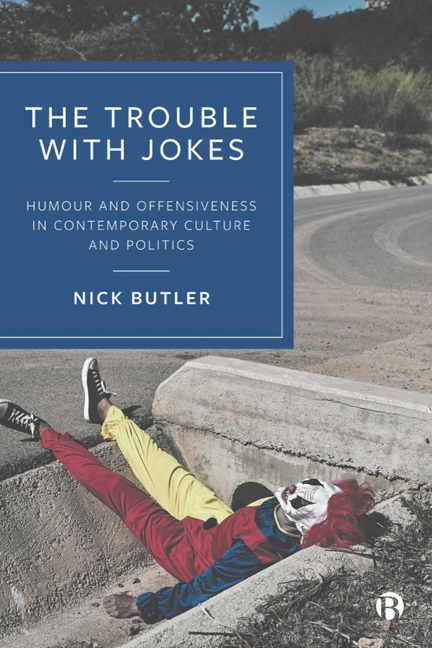Conclusion
Published online by Cambridge University Press: 27 March 2024
Summary
This book is a warning label for jokes, especially offensive ones. Of course, warning labels sometimes go unheeded. For example, safety stickers on toys don’t stop kids from swallowing Lego bricks and ending up in the hospital. Likewise, racists, misogynists, and homophobes will continue to tell jokes that injure others, no matter how much we implore them to stop. For the rest of us, The Trouble with Jokes aims to shed light on the kinds of laughter we’re capable of, the types of humour we enjoy, and the effects our jokes have on those at whom they’re directed. In particular, the book wants to recognize humour for what it is: a form of communication that’s so effective at conveying its message – whatever that may be – precisely because it denies that it’s trying to tell us something important in the first place. This is why humour is the go-to medium for political extremists. An offensive joke doesn’t yell and scream and kick down your door; it gets you to invite it in for a friendly chat about nothing in particular. Before long, it’s moved into your house and turned your spare room into a base for its political operations.
One of the most nuanced explorations of comedy and its attendant risks is found in Trevor Griffith’s 1975 stage play Comedians. Comedians has become a touchstone for thinking critically about humour, and for good reason. Set in an evening class for amateur stand-ups in the north of England, the play explores the familiar tensions around comedy: its ability to comfort, its willingness to shock, its flair for critique, and its propensity for violence. The play invites us to listen to the jokes told by the different characters and then helps us to pick apart the assumptions beneath the jokes. Some jokes are gentle and harmless. Others are edgy and transgressive. Yet others are mean and nasty. It’s never clear where we’re supposed to draw the line between joke-telling and hatemongering, or if there’s a line to be drawn in the first place. The play leaves us with no easy answers and offers few consolations; the only lesson is that humour is a pharmakon, both poison and cure.
- Type
- Chapter
- Information
- The Trouble with JokesHumour and Offensiveness in Contemporary Culture and Politics, pp. 130 - 135Publisher: Bristol University PressPrint publication year: 2023



